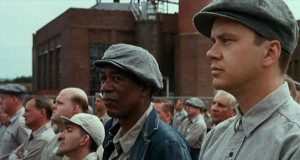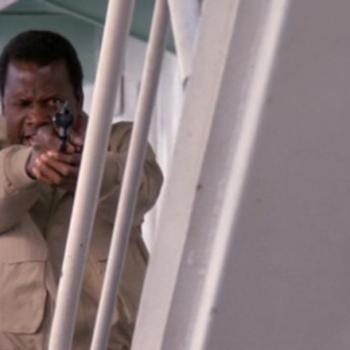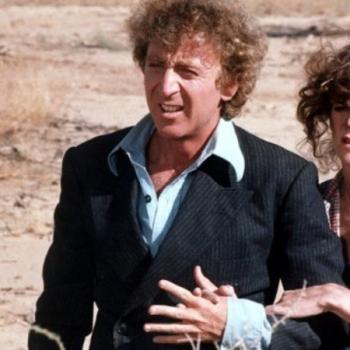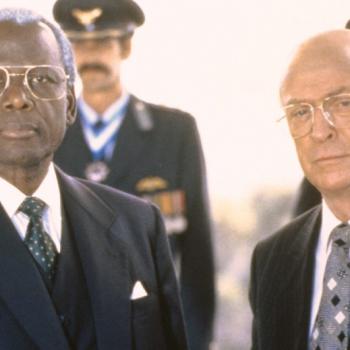 Prison films are a tricky genre. The prisons themselves become metaphors for the shackles of authority, society, or psychological inhibitions that prevent people from being completely free human beings. We empathize with the prisoners, and never the warden (unless, as in Brubaker, he fights for the prisoners’ rights), because they are supposed to represent that nebulous quality known as “the human spirit”.
Prison films are a tricky genre. The prisons themselves become metaphors for the shackles of authority, society, or psychological inhibitions that prevent people from being completely free human beings. We empathize with the prisoners, and never the warden (unless, as in Brubaker, he fights for the prisoners’ rights), because they are supposed to represent that nebulous quality known as “the human spirit”.
The tricky part is that prisoners are usually in jail for a reason. An entire sub-genre of P.O.W. films avoids this problem by making prison not a matter of crime, but of being in the wrong army; with Nazis for wardens, who wouldn’t be on the prisoners’ side? But in The Shawshank Redemption, the prisoners are, with few exceptions, convicted murderers with life sentences. Except, maybe, Andy Dufresne (Tim Robbins). A banker convicted of killing his wife and her lover, Dufresne is shy and withdrawn when he first arrives in the prison. It’s not really clear at first whether he actually did commit the murders: Dufresne protests his innocence in court, but all the evidence points to him.
In prison, he befriends Ellis Boyd “Red” Redding (Morgan Freeman), a convict with twenty years and a few parole rejections under his belt, who has found a niche for himself as an importer of contraband goods. Red and his friends have been in jail so long that they don’t really want to be free. The prison walls that cut them off from their friends and family have become shields that defend them from the ravages of an ever-changing world. Within these maximum security walls, they are “secure” from the burden of freedom.
Prison has the exact opposite effect on Dufresne, who exploits every possible opportunity to bring a taste of the outside world to himself and his fellow convicts. He curries the favour of the warden and guards by taking care of their finances, and uses his position to get beers for his friends and a library for the inmates. Before long, Shawshank looks more like a modern-day high-school than it does a 1950s prison. Of course, the human spirit must rebel a little too, and in a scene corny enough to give Penny Marshall wet dreams, Dufresne locks himself in the warden’s room to play some opera over the prison yard’s p.a. system. As one, all the prisoners stop in their tracks to gaze in awe at the soprano loudspeakers. Vainly I waited for one, just one, prisoner to blurt, “What the fuck is that?”
Much of this movie is played for laughs, but there are scenes of brutality beyond even what we might have expected from director Frank Darabont (co-writer of Nightmare on Elm Street 3 and The Blob) and Stephen King, whose short story was the basis for the film. Dufresne is gang-raped by “the sisters”, and several prisoners get beaten senseless by Captain Hadley (Clancy Brown).
Unfortunately, the prison authorities are so thoroughly evil that the film descends into a sort of black-and-white dualism. The ambivalent natures of the possibly guilty Dufresne and the Bible-thumping prison warden (played by former seminary student Bob Gunton) are starkly polarized in the film’s final act so there’ll be no mistake which of them we ought to be cheering for. The finale is a rousing crowd-pleaser, but also a clichéd cop-out.
The cast is superb. A real chemistry seems to bond Robbins, Freeman, and their inner circle. Will Sadler, the stone-faced bad guy in Die Hard 2, steals several scenes as the country-loving Heywood, and Vancouver native Gil Bellows shines as Tommy, the cocky high-school drop-out whose fate is pretty much sealed once we’re told he has a wife and baby son waiting for him outside the prison walls. Brown, with his hair trimmed so neatly he’s this close to being a dead ringer for Al Gore, displays an obsessive brutality that his Highlander role never hinted at. Freeman delivers a subtle but potent performance, letting just the teeniest dabs of despair leak through the cracks of his easy-going facade. Robbins brings the perfect mixture of fresh-faced bewilderment and canny deceit to his role as Dufresne, handling the dramatic and comic elements with equal ease. Watching these actors work together is a real treat, and they more than make up for the script’s deficiencies.
— A version of this review first appeared in The Campus Times.












